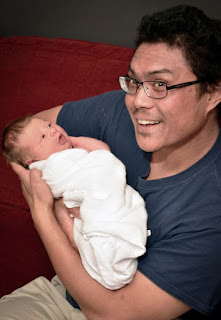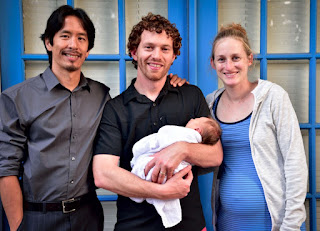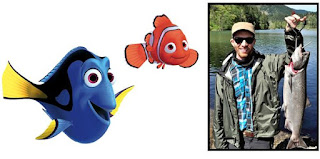I have had a deep ambivalence about the concept of family ever since I was a kid. I grew up in a family environment that provided a lot for me- from material and logistical needs up to and including many emotional needs. That environment, despite all of the people in it, also had many important emotional elements lacking.
 |
| My childhood family. I wasn't as happy back then. |
When I left for college my ambivalence came with me. People told me I was bitter about family and at times my pessimism about that social group made it so wouldn't want children. I felt like I was on my own and I developed an independent streak to adapt. I did what I could to avoid my own family environment- not because I was ungrateful but because I found it to be miserable & emotionally suffocating at a time when I needed so much more. I did find an important social network to replace that loss of family: another family. This first happened with my friend Jen and her family. However, I found even more support elsewhere.
I was fortunate at the end of high school and throughout college to immerse myself in another family environment- that of my best friend and his cousins- and it was wonderful. Holidays were times to have fun & to laugh. Quieter moments together with them could still be so meaningful.
I was fortunate at the end of high school and throughout college to immerse myself in another family environment- that of my best friend and his cousins- and it was wonderful. Holidays were times to have fun & to laugh. Quieter moments together with them could still be so meaningful.
 |
| Thanksgiving 2004 with the Klages & Mariano Families |
To be sure, this family is composed of individuals that have their strengths and weaknesses. But what they showed me was something so important: a demonstration of loyalty, openness and love that is just so critical to a family's success. It wasn't until I saw these elements play out with my adopted family that I knew what was lacking in my actual family environment. That lesson has stayed with me to this day.
That experience started me on a path from ambivalence to real excitement about what a family could be. It taught me that when the right principles are introduced- honesty, emotional openness, happiness, respect, loyalty- the family culture has the highest chance of being successful. The unhappiness my parents experienced with each other prevented a lot of those values from taking hold in our home while I was growing up.
I am pleased to say that after leaving home I was able to remain close with the elements of my family that are building these values- my siblings. The relationships I have with them now in my adult life strengthen me as Alice and I build our new family.
 |
| My uncle, cousin and some of my siblings in June of 2013 |
 |
| Our youngest brother is also the tallest |
I have learned in the last two weeks that having a child can elevate pre-exisiting familial bonds. The best example of that is with my wife's family. While I've felt close with them before the baby showed up the outpouring of love from them in the last week has helped me realize that this concept of family can do so much more. Their support and warm wishes have made me more relaxed and feel so much closer to them- whether it's shown next to me in the living room or sent from Utah or Indiana.
 |
| Aunt Ellen & Uncle Jack |
 |
| Nana Lou and Alice |
 |
| Even more family! |
I am lucky I was given the exposure to all of the family environments I have detailed above. Each one has taught me important things about what Alice and I are about to build. My childhood family taught me through an absence of important traits. The families I have identified with since leaving home have taught me through example & expertise- and that's where my real education began. The tool kit these families have provided, along with the ongoing support of our friends past & present, has given me the ability to be successful as a dad. It's now on me to put that knowledge to good use & to always keep it in sight.
Thank you for reading.
 |
| The author in deep thought on how to build a successful family environment |
 |
| The author role modeling family culture through the Koala Method |
































